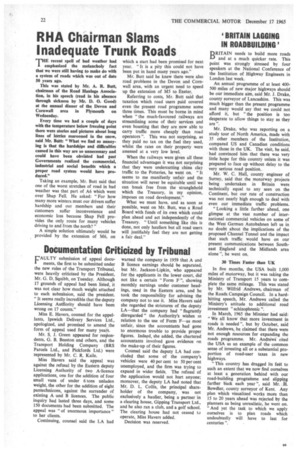RHA Chairman Slams Inadequate Trunk Roads
Page 24

If you've noticed an error in this article please click here to report it so we can fix it.
THE recent spell of bad weather had I emphasized the melancholy fact that we were still having to make do with a system of roads which was out of date 50 years ago.
This was stated by Mr. A. R. Butt, chairman of the Road Haulage Association, in his speech (read in his absence through sickness by Mr. D. 0. Good) at the annual dinner of the Devon and Cornwall area in Plymouth on Wednesday.
Every time we had a couple of days with the temperature below freezing point there were stories and pictures about long lines of lorries marooned in the snow, said Mr. Butt: "What we find so annoying is that the hardships and difficulties caused in this way are so unnecessary and could have been obviated had past Governments realized the commercial, industrial and social benefits which a proper road system would have produced."
Taking an example, Mr. Butt said that one of the worst stretches of road in bad weather was that part of Ab which went over Shap Fell. He asked: "For how many more winters must our drivers suffer hardship and our members and their customers suffer inconvenience and economic loss because Shap Fell provides the only route for many vehicles driving to and from the north?'
A simple solution ultimately would be provided by the extension of Mb, on which a start had been promised for next year. "It is a pity this could not have been put in hand many years ago."
Mr. Butt said he knew there were also road problems in the Devon and Cornwall area, with an urgent need to speed up the extension of M5 to Exeter.
Referring to costs, Mr. Butt said that taxation which road users paid covered even the present road programme some three times. This must be borne in mind when "the much-favoured railways are streamlining some of their services and even boasting that they are now able to carry traffic more cheaply than road operators ". This was not surprising, as they paid no tax on the fuel they used, whilst the rates on their property were assessed at a very low level.
When the railways were given all these financial advantages it was not surprising that they were undercutting china clay traffic to the Potteries. he went on. "It seems to me manifestly unfair and the situation will never be equitable until we can break free from the stranglehold which the Treasury. in my opinion, imposes on road development."
What we must have, and as soon as possible, went on Mr. Butt, was a Road Board with funds of its own which could plan ahead and act independently of the Treasury. "Until something like this is done, not only hauliers but all road users will justifiably feel they are not getting a fair deal."












































































































